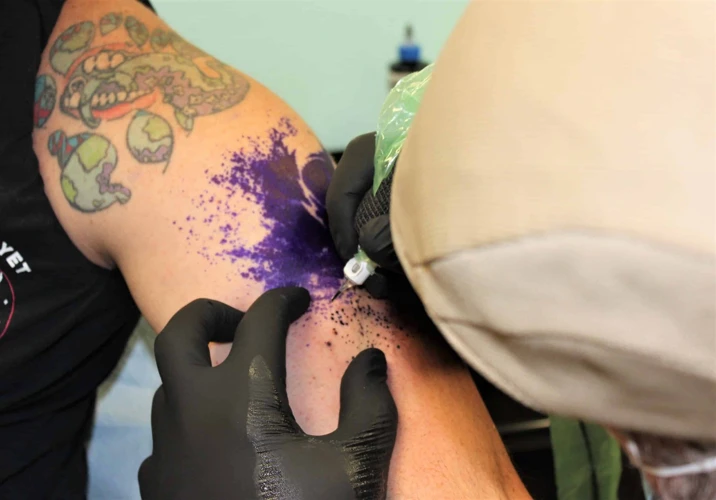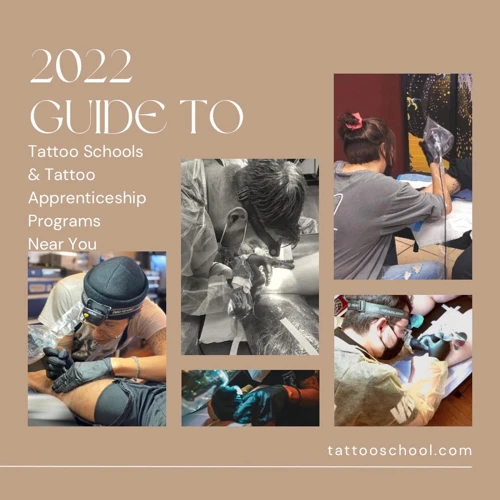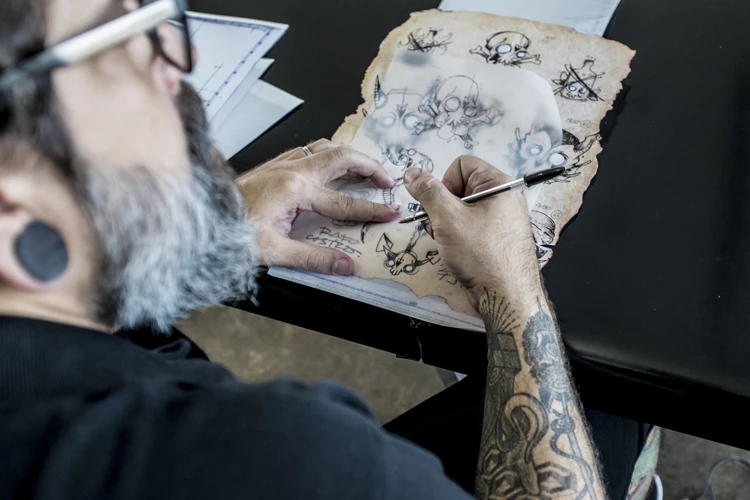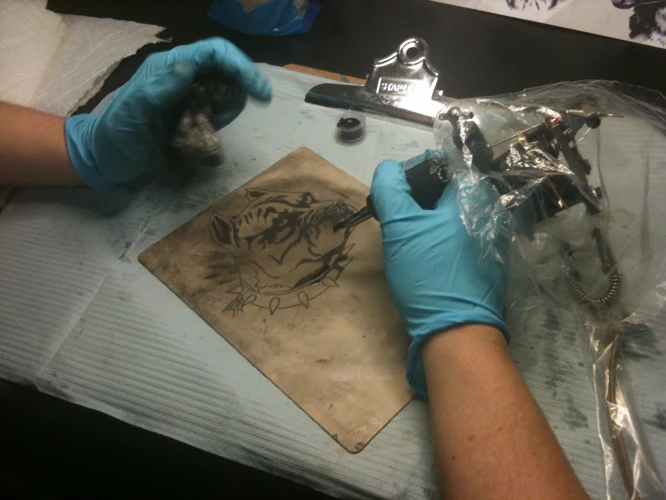If you’re wondering how long it takes to become a professional tattoo artist, the answer is not a straightforward one. Tattoo school can be a long and arduous process, depending on the type of program you choose and the level of skill you wish to attain. With the right dedication and guidance, you can become a professional tattoo artist in as little as two years. This guide will provide you with the information you need to make an informed decision about how long it will take you to attend tattoo school.
Contents
Understanding Tattoo School

What is Tattoo School?
Tattoo school, also known as a tattoo apprenticeship, is a program that teaches you the basics of how to be a professional tattoo artist. It is a comprehensive program that covers the fundamentals of tattooing, including the design, anatomy, safety protocols and techniques. The program usually consists of both in-person and online classes, as well as hands-on training with experienced mentors.
What Do You Learn in Tattoo School?
At tattoo school, you’ll learn the fundamentals of tattooing, including the anatomy of the body and the different techniques used to create tattoos. You’ll also learn about the various types of inks and pigments used in the tattoo process, as well as the safety protocols and regulations that must be followed. Additionally, you’ll learn how to create custom designs and how to work with clients to ensure that their tattoos are exactly what they want.
How Long Does it Take to Be a Tattoo Artist?
The length of a tattoo school program can vary depending on the school and the individual student, but typically, most tattoo school programs take between six months and a year to complete. During this time, students will learn the fundamentals of tattooing and practice their skills under the tutelage of experienced mentors. Once students complete the program, they can then apply for a professional tattoo artist license and begin working in the industry.
Prerequisites for Tattoo School

Qualifications
To become a professional tattoo artist, you need to have the necessary qualifications. You must have a high school diploma or a GED equivalent. You must also have a good understanding of art and design principles, as well as basic machine maintenance skills. It is also important to have good people skills and the ability to work well with customers.
Cost
The cost of tattoo school depends on the program you choose. Most courses run for at least six months and can cost up to $10,000. In addition, you must also cover the cost of tattoo supplies, such as needles, inks, and equipment. It is also important to factor in the cost of living expenses while you are enrolled in the program.
How Long Does It Take to Learn to Tattoo?
Typically, it takes six months to two years to become a professional tattoo artist. However, this can vary depending on the program you choose, your level of experience, and how quickly you are able to learn and apply the skills you are taught.
Time Commitment for Tattoo School

Course Duration
Tattoo school typically lasts anywhere from 6 months to 1 year. It depends on the program itself and whether you take classes full-time or part-time. It’s important to check with the school directly to determine the exact duration of the program.
Hours Per Week
If you choose to attend tattoo school full-time, you can expect to commit at least 20 hours per week to classes, tutorials and lab time. Part-time programs are usually more flexible and can be completed on evenings and weekends. It is important to factor in additional time to practice on your own to ensure you have the necessary skills to become a professional tattoo artist.
Training Program

Types of Tattoo Training
Traditional apprenticeships are the most common way to become a professional tattoo artist. An apprenticeship usually requires a 1-2 year commitment and involves learning from a more experienced artist. This type of training is designed to give you the knowledge and skills needed to become a successful tattoo artist.
Hands-On Training
Most tattoo artists learn the basics of tattooing through hands-on training. This includes learning how to draw, prep, and execute tattoos, as well as safety protocols. Learning to use the tattoo machine is also an important part of hands-on training.
Theory Training
Many tattoo schools also offer theory training, which includes anatomy, color theory, and design principles. This type of training is important in understanding how to create beautiful, high-quality tattoos. Theory training is also important for understanding the legal and ethical aspects of the tattooing industry.
Learning Styles

Self-Study
Self-study is a great way for those who have the drive and dedication to become a professional tattoo artist, but do not have the time or money to attend a traditional tattoo school. This approach is great for those who have already developed their artistic skills and are looking to hone their craft and learn the technical skills required to be a successful tattoo artist.
Apprenticeship
Apprenticeship is a great way to learn the trade and develop your skills under the guidance of an experienced professional. It is important to find the right mentor and shop to ensure you receive the best training and develop the skills needed to become a successful tattoo artist. Apprenticeships usually take between 1 and 2 years, but can vary depending on the experience and skill of the apprentice.
Certification

Requirements
To become a professional tattoo artist, you must obtain a valid certification from a recognized school or program. This certification is an acknowledgement of your mastery of the art form and knowledge of all aspects of tattooing. In order to achieve this certification, you must have a combination of both practical and theoretical training. You will need to have a basic understanding of tattoo equipment and safety, as well as the fundamentals of drawing and tattooing. You will also need to have a strong understanding of the various tattoo styles, such as tribal, traditional, blackwork, and color work. You will also need to complete a certain number of hours of supervised tattooing and have a portfolio of your work to demonstrate your skill level.
Benefits
Having a certification from a recognized school or program offers a number of benefits to the professional tattoo artist. It provides a level of credibility that will allow you to stand out from other tattoo artists and potentially make more money. It also serves as a form of insurance for the client, ensuring that the artist is knowledgeable and experienced. Additionally, it will give you the opportunity to work in a professional environment and network with other experienced artists.
Ultimately, having a certification is a sign of dedication and commitment to the craft of tattooing, and it can open many doors for the aspiring artist.
Finding a Tattoo Studio
- Research Tattoo Studios: Start your search by researching the best studios in your area. Look for studios that have a good reputation and a portfolio of impressive artwork.
- Visit the Studios: After you have narrowed down your options, visit the studios. This will give you a better idea of the atmosphere and the artists that work there. Talk to the artists and ask them about their experience and training.
- Check Their Licenses: Make sure the studio is properly licensed and that the license is up to date. Make sure the artists have the proper certifications and that the equipment is clean and sterilized.
- Read Reviews: Check out customer reviews online to get an idea of what other people think of the studio. This will help you get an unbiased opinion of the studio and its services.
- Ask Questions: Be sure to ask any questions you may have about the studio and the artists. Ask about their policies and pricing, and make sure you feel comfortable with the studio before making a commitment.
Frequently Asked Questions
What qualifications are necessary to become a professional tattoo artist?
To become a professional tattoo artist, one must have an artistic eye and a steady hand. Tattoo artists must also have knowledge of health and safety regulations, as well as a good understanding of the techniques and tools needed for the job. Furthermore, tattoo artists must be able to create designs that are both aesthetically pleasing and technically sound, as well as possess excellent customer service skills. Additionally, many states and provinces require that tattoo artists be certified by a recognized regulatory body.
What type of training and certification do I need to become a professional tattoo artist?
- Apprenticeship: A professional tattoo artist will usually require an apprenticeship, which is a period of training that involves working alongside an experienced tattoo artist. During this period, the apprentice will learn the basics of tattooing, such as hygiene, skin preparation, and aftercare. Apprenticeships can last from six months to two years, depending on the apprentice’s progress.
- Health and Safety Certification: Professional tattoo artists need to have certification in health and safety, which is usually provided through the state health department. This certification covers topics such as infection control, sterilization techniques, and proper disposal of needles and other tattooing materials.
- Licensing: Professional tattoo artists also need to be licensed by their state, which requires passing an exam and meeting other requirements. Each state has different requirements for licensing, so it is important to research this before starting the process.
- Continuing Education: Professional tattoo artists should also stay up to date on the latest trends and techniques by taking classes or attending seminars. This is important to keep up with the latest regulations and health and safety protocols.
How long does it take to complete a tattoo school program?
- Foundation Course: This typically consists of lectures, demonstrations and practical exercises and can take between one to three weeks to complete.
- Advanced Course: This usually involves more in-depth techniques and will usually take between four to six weeks to complete.
- Apprenticeship: This is often the most time consuming element of tattoo training, with apprenticeships lasting anywhere between six months to several years.
- Certification: After the apprenticeship, most tattoo schools will require the student to take a certification test, which may take a few hours or days depending on the school.
In total, it can take anywhere from two to several years to complete a tattoo school program.
Is it possible to become a Professional Tattoo Artist without Attending Tattoo School?
- No Licensing Requirements: It is possible to become a professional tattoo artist without attending tattoo school if there are no licensing requirements in your state. In such cases, you can start your business without any formal training.
- Apprenticeships: You can also become a professional tattoo artist without attending tattoo school by taking an apprenticeship at an established tattoo parlor. This allows you to gain hands-on experience and learn the trade while working with a professional. However, the apprenticeship period can last anywhere from 6-12 months.
- Self-Taught: You can also become a professional tattoo artist without attending tattoo school by teaching yourself. This requires a lot of self-discipline and dedication as you will need to learn the trade on your own. It also requires investing in the right equipment and supplies, as well as finding a mentor who can help you to hone your craft.
- Online Courses: You can also become a professional tattoo artist without attending tattoo school by taking online courses. These courses provide you with the necessary knowledge and techniques to become a professional artist. However, the quality and effectiveness of these courses may vary depending on the provider.
What are some of the common challenges associated with becoming a professional tattoo artist?
- Staying updated and keeping up with trends: As a professional tattoo artist, you need to stay updated on the latest trends in the industry. You also need to be aware of the latest trends in tattoo design and technique, as well as the latest inks and equipment.
- Maintaining a high level of hygiene: It is essential for a professional tattoo artist to maintain a high level of hygiene and safety when working with clients. This includes using proper sterilization techniques, wearing gloves and protective clothing, and following all safety protocols.
- Building a strong client base: As a professional tattoo artist, it is important to build a strong client base. You must be able to promote yourself and your work in order to attract new customers.
- Developing the right skills: Professional tattoo artists must have a deep understanding of the art, as well as the technical skills required to execute the designs. They need to understand the anatomy of the skin and be able to work quickly and accurately.
- Dealing with clients: Tattooing is an intimate and personal process and requires the artist to be patient and understanding. Tattoo artists must be able to build trust and rapport with clients in order to create a successful tattoo experience.
Conclusion
Becoming a professional tattoo artist requires time and dedication. Before enrolling in a tattoo school, consider your goals, budget, and availability. Research the school’s curriculum and certifications to ensure that you’re getting the best education for your investment. Taking a tattoo school course will help you learn the fundamentals of tattooing, safety, and sanitation, which are essential in becoming a successful tattoo artist. With practice and hard work, you can become a professional tattoo artist and achieve success in the industry.